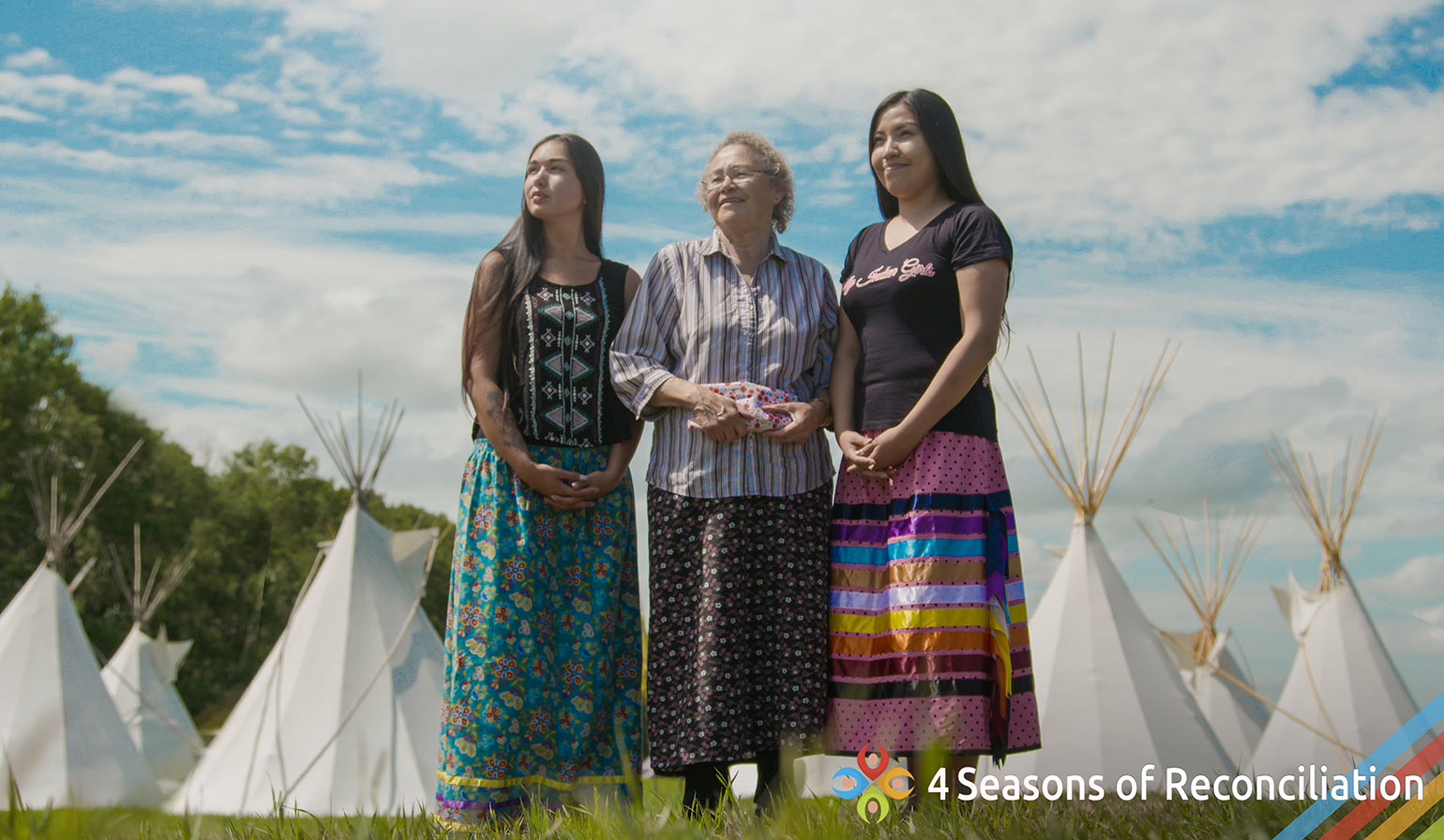This article originally appeared on the RBC Diversity site on June 24, 2020.
Within the Truth and Reconciliation Report, call to action #92 is directed to Canada’s private sector. It calls upon corporate Canada to adopt the United Nations Declaration of the Rights of Indigenous People and asks for — among other things — meaningful consultation, long-term opportunities and the education of both management and staff on the history of Indigenous people.
In an effort to bridge the gap in education — and enable the private sector to fulfill this call to action — the film Economic Reconciliation was created. The hopeful and inspiring documentary was written by Indigenous writer and publisher Maurice Switzer and produced by Gemini-nominated Andrée Cazabon — a passionate ally to Indigenous people since 2007. Its inspiration, however, was David Sharpe, CEO of Bridging Finance Inc. and Chair Emeritus of First Nations University of Canada. Sharpe is a man who walks both worlds — a man who hid his identity as an Indigenous person for many years. “I felt if I came out and said who I am, that I would be excluded from power and opportunity,” he reveals in the film. Following the TRC report, Sharpe felt the days of hiding were over. As a member of both the business and Indigenous communities, he wanted to compel his corporate counterparts to honour the call to action.
The release of the film marked the first invitation to the financial sector to learn about the Truth and Reconciliation Report and specifically about call to action #92. Featuring Indigenous and non-Indigenous leaders who share their insights, as well as a hopeful glimpse at a respectful and prosperous future, the film demonstrates that reconciliation is key to a thriving Canada for all.
A Screening for Corporate Canada
The film was screened at the Economic Club of Canada, exclusively for the private sector in 2018 . “It had taken four years after the TRC final report for the first conversation on Bay Street to happen,” says Cazabon.
Nine survivors were honoured at the event, seated amidst corporate representatives, which led to inspiring and effective connections. The event was a success, and the call after the screening was unambiguous: “OK, corporate Canada,” Cazabon said. “How are you going to use this film as a way to honour call to action #92?”
Of all the corporations represented at the event, RBC was the first to take up the call. And it wasn’t a matter of showing the film in the basement of a local branch. Rather, RBC’s move was weighty and provoking. Cazabon calls is a “catalyst.”
Following the screening, Dale Sturges, National Director, Indigenous Financial Services at RBC, mentioned the film to colleagues, who contacted Cazabon to arrange a showing at RBC. Sturges and the team committed to embarking on a journey that would support call to action #92 through the education of RBC’s 85,000 employees.
From Awareness to Action
RBC’s relationship with and support of Indigenous communities is both meaningful and long-standing. The journey of Indigenous inclusion began over 10 years ago with a pledge to further reconciliation, remove systemic barriers, and enable success for First Nations, Inuit and Métis communities across Canada.
“One of the most important things we can do while working in and for Indigenous communities is making sure we are honouring the Truth and Reconciliation Commissions’ call to action #92,” says Sturges.
Working with the film’s creators and First Nations University, the RBC team looked at ways to incorporate the film’s message and power into an e-learning program for employees. The result is an interactive, current and easy-to-digest program that is broken into different modules covering topics such as residential schools, the history of treaties, recognition of Indigenous rights and titles, Indigenous culture and more. Employees can pick a module or two, or complete all ten. A badge of completion is earned for each module — and you receive a certificate validated by First Nations University of Canada if you complete the entire program.
“It’s a very interactive, easily accessible way of creating awareness across the organization,” says Sturges. “The objective is the more we know, the better we do.”
The First Step of the Journey
RBC and First Nations University of Canada hope that the course can close the education gap in Indigenous history for RBC employees. But it doesn’t tell the whole story, nor does it satisfy the learning Canadians have left to do.
“This course is a great starting point,” says Cazabon. “It’s a foundational piece — a 1-0-1 that none of us received in our education journey. And once you know that you need to know, you seek ways to continue your learning. To take the kind of step needed for transformative learning, you need to build a base. The course isn’t meant to replace in-person connections with Indigenous people, but rather to inspire them.”
Ultimately, the goal is to keep Canadians talking about Indigenous history, so that the country can continue making progress on reconciliation.
“Many Canadians are not aware of the Truth and Reconciliation Commission, and specifically the calls to action,” Sturges says. “Part of my responsibility is to help change that — both for employees and the public we serve so that everyone knows reconciliation is something RBC takes responsibility.”
But in truth, it’s everyone’s responsibility. As Perrin Beatty, President & CEO, The Canadian Chamber of Commerce says in the film, “This isn’t somebody else’s issue. We all have a role to play.”

The Future Is Bright
There is a palpable sense of hope among Indigenous people and the Canadians who are dedicated to furthering the movement. As Dawn Madahbee Leach, GM, Waubetek Business Development Corporation says: “The door is wide open for those who want to work on economic reconciliation,”
This article is intended as general information only and is not to be relied upon as constituting legal, financial or other professional advice. A professional advisor should be consulted regarding your specific situation. Information presented is believed to be factual and up-to-date but we do not guarantee its accuracy and it should not be regarded as a complete analysis of the subjects discussed. All expressions of opinion reflect the judgment of the authors as of the date of publication and are subject to change. No endorsement of any third parties or their advice, opinions, information, products or services is expressly given or implied by Royal Bank of Canada or any of its affiliates.



















